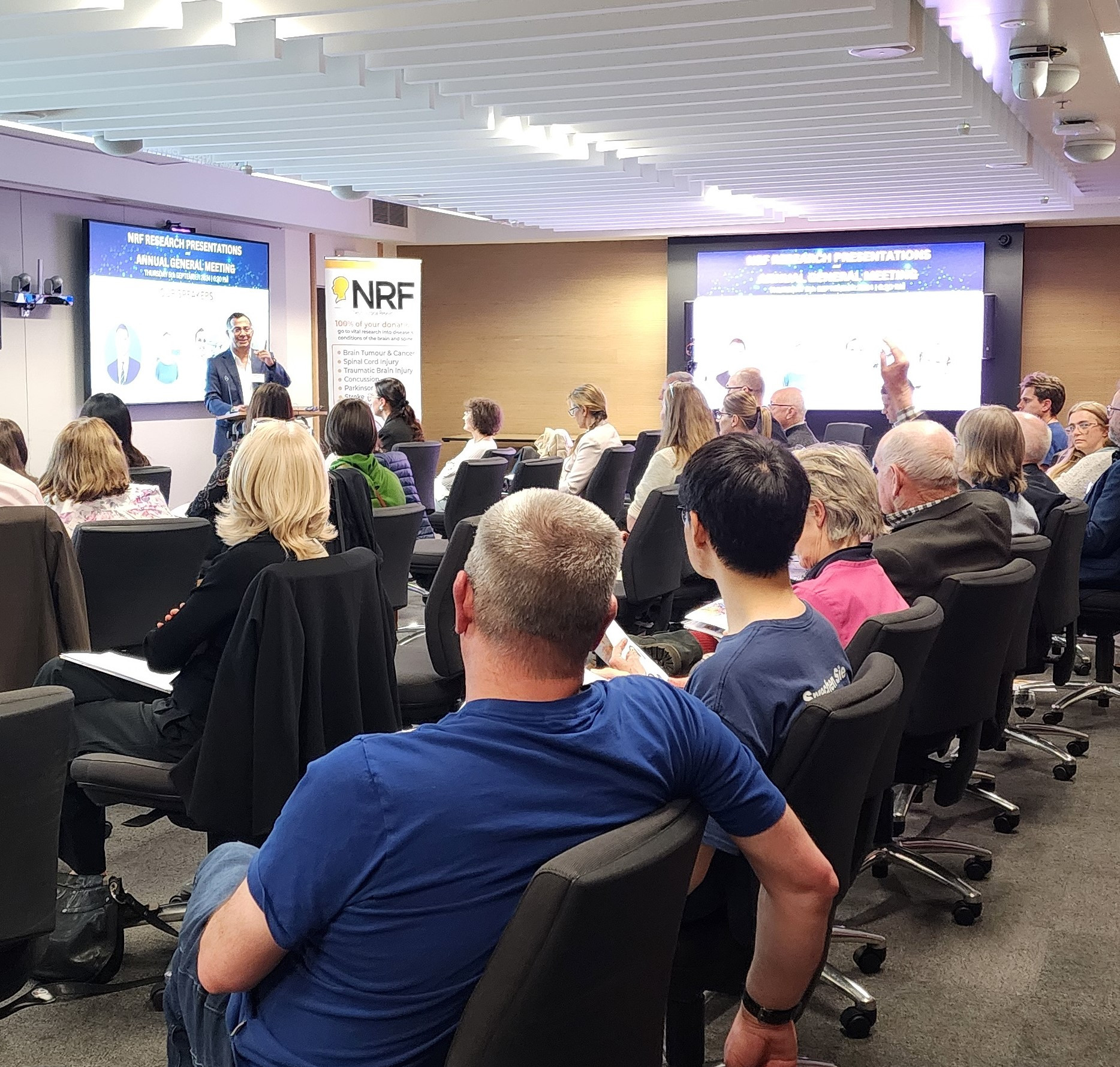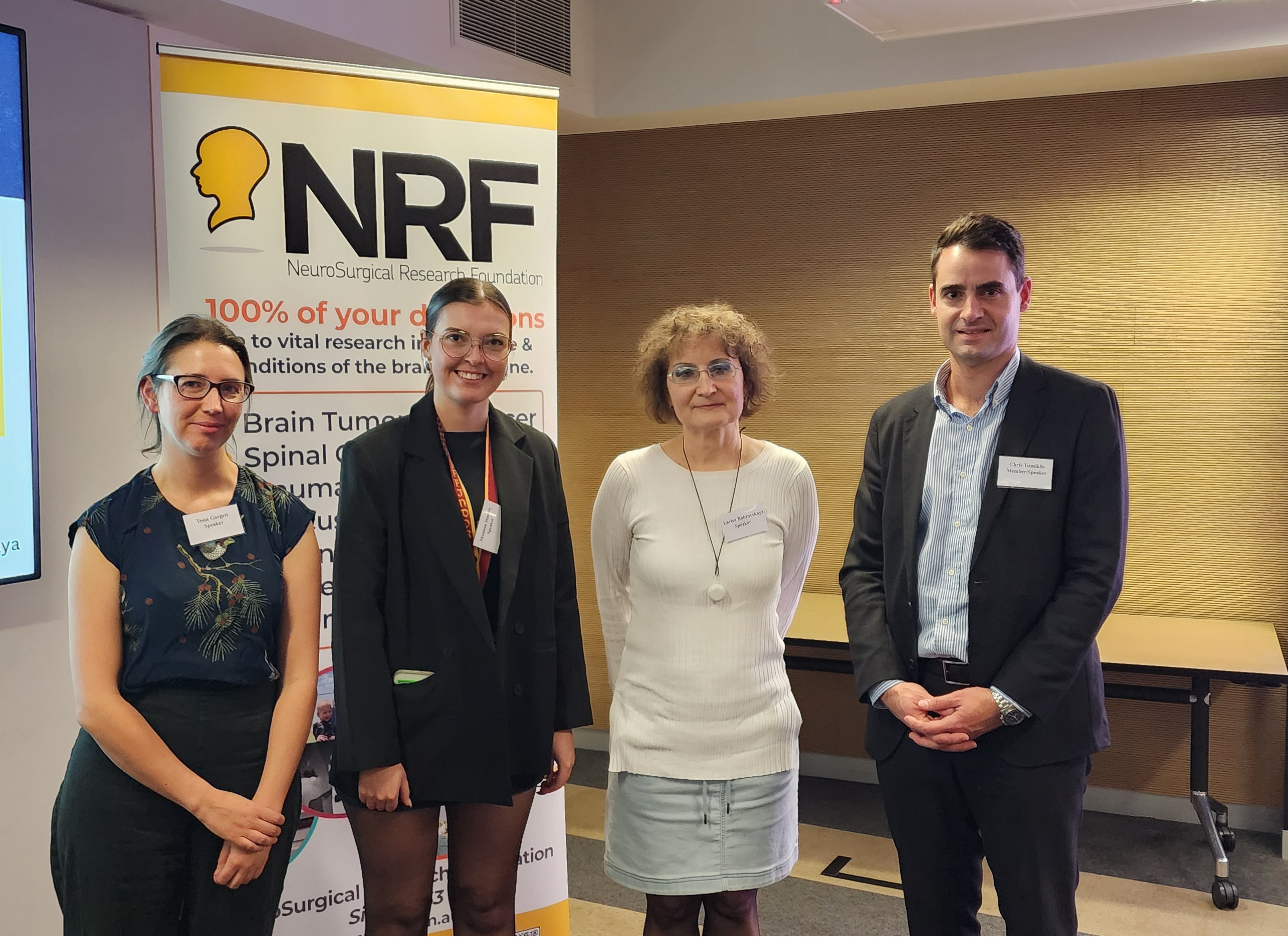NRF Research Showcase Highlights Your Impact
The latest NRF Research Showcase highlighted the exciting progress being made in spinal surgery, brain tumour, stroke, and Parkinson's disease research thanks to your generosity.

Thank you to everyone who attended the NRF Research Showcase held Thursday 5th September, and to our wonderful presenters who shared the latest updates from their NRF-funded projects.
The evening really highlighted the significant impact of continued research funding and the high calibre of research being undertaken right here in SA, improving our understanding of disease pathology and translating promising ideas into new treatment options for patients.
View the presentations below:
Dr Chris Tsimiklis - 'Update on endoscopic spine surgery in SA'
Dr Chris Tsimiklis discussed the benefits of minimally invasive endoscopic spinal surgery for eligible patients including reduced operating time, reduced hospital stay, reduced complications, and faster post-operative recovery. Supported by the NRF Dinning Memorial Scholarship, Dr Tsimiklis was able to travel to global centres and learn this specialised technique, performing the first endoscopic spinal surgery at the Memorial Hospital in late 2022. Dr Tsimiklis has helped create the Endoscopic Spine Society of Australia to train other Adelaide surgeons in this technique. He now hopes to obtain sufficient funding to purchase the necessary equipment to bring endoscopic surgery to public hospitals, ensuring equity of access to all patients.
Dr Tessa Gargett - 'Cell therapies for treatment of primary brain tumours'
The video below is provided courtesy of CALHN.
Dr Tessa Gargett from the Centre for Cancer Biology discussed the latest CAR-T cell therapy research, utilising genetically modified white blood cells to target and attack cells of primary brain tumours. One branch of the preclinical research involves testing multiple variations of CAR-T cells to identify the most effective. At the same time two Phase 1 clinical trials are underway for adult glioblastoma and paediatric midline glioma patients. Five adults and three children have now received the treatment and excitingly none to date have had any toxicity or serious adverse events, with both trials now proceeding to dose escalation. Thanks to your generosity the NRF has been able to fund all stages of these trials including the preclinical research phase, CAR-T cell manufacturing right here in Adelaide, and expanding the original trial to ensure additional patients can receive this groundbreaking treatment.
Dr Gargett was also kind enough to share an incredible video showing a CAR-T call in action. Watch below as the green CAR-T cell targets the grey tumour cell which turns red signalling tumour cell death.
Shannon Stuckey - 'Neuroinflammation and Functional Decline in Delayed Neurodegeneration following Ischaemic Stroke'
PhD Candidate Shannon Stuckey has been undertaking one of the first studies investigating the role that neuroinflammation plays in delayed secondary neurodegeneration, a phenomenon where brain tissue loss occurs in the weeks-months following stroke in areas distant from the original cerebral blockage. Initial results analysing patient biomarkers are suggestive of a post-stroke immunosuppresion process occuring in the 15 month group, potentially contributing to subsequent brain tissue loss and driving functional decline. Further research and better understanding of this process will enable the development of targeted treatments to improve stroke outcomes.
A/Prof Larisa Bobrovskaya - 'The role of orexin in Parkinson's disease'
A/Prof Larisa Bobrovskaya and her team have recently done a review of the current research on Orexin neurons and their potential role in Parkinson's disease.
Parkinson's disease is the fastest growing neurological condition in the world with 10 million people currently affected and no cure. Originally considered a motor disorder, Parkinson's is now considered a systemic disorder as it can have many non-motor symptoms such as sleep distubances, cognitive dysfunction, GI dysfunction, and depression/anxiety.
Orexin neurons are located in the hypothalamus and project throughout the whole brain, and have been found to play a role in regulation of sleep-wake states, motor control, learning and memory, stress/anxiety, GI function, and neuroprotection suggesting a potential role in the development of Parkinson's disease and other neurodegenerative disorders. Recently, the NRF funded a new piece of equipment, the first of its kind in Australia, which will allow for non-invasive monitoring of preclinical models of Parkinson's to determine the impact of orexin neurons on Parkinson's disease and regulation of sleep/wake cycles. There are currently clinical trials underway for the use of orexin neuron therapy to treat narcolepsy, so if preclinical studies show potential effectiveness of orexin therapy as a treatment for Parkinson's disease, this would result in relatively quick translation to clinical studies.

Thank you to all our wonderful speakers for sharing their latest work and exciting results. If you would like to help fund groundbreaking research and make a real difference in the lives of patients by supporting the development of better treatments, please donate today.




